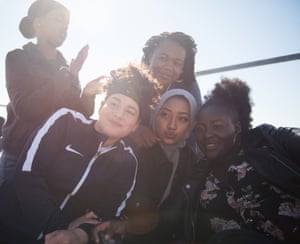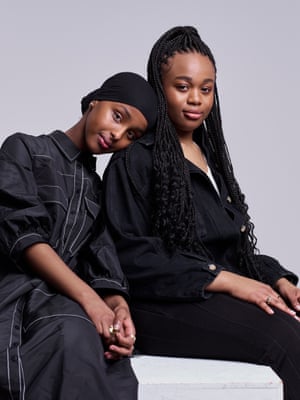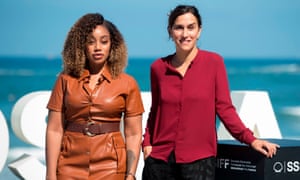beyonce movies |
| Rocks stars: meet the teenage cast of the hot new British film - The Guardian Posted: 08 Mar 2020 03:29 AM PDT Seven teenage girls are falling over themselves with laughter. They're meant to be posing for a picture, but it's a bit like photographing a box of puppies – they can't keep still, pawing and hugging and joking, and bursting into coordinated dance moves. Someone puts on Beyoncé's Brown Skin Girl, and her lyrics could hardly be more apt: "Your skin is not only dark, it shines and it tells your story/ Keep dancing, they can't control you". "One still one, please," begs the photographer. But this is the cast of the film Rocks, a celebration of female friendship in east London – and they are unstoppable. They pull peace signs, stick out their tongues. They keep laughing. Rocks is directed by Sarah Gavron, and if it seems a world away from her last hit, 2015's period drama Suffragette, both reflect her mission to put the lives of women in the spotlight. A collaborative project, co-written by Theresa Ikoko and Claire Wilson, Rocks tells a fictional story developed through workshops with teenage girls from east London, and its cast are largely non-professional actors making their screen debuts. The girls improvised the dialogue while two cameras rolled, giving Rocks a documentary-style feel and a tang of authenticity. The story focuses on Rocks, a British-Nigerian teenager played by Bukky Bakray, who lives on an estate in Hackney. When her mum, struggling with mental health issues, takes off, Rocks is left to look after her little brother – and fears they'll be taken into care and separated if anyone finds out. As pressure mounts, she struggles to keep things together. The Guardian's Peter Bradshaw anointed Rocks the best film at Toronto film festival, describing the film-making as "in the spirit of Ken Loach's Kes or Céline Sciamma's Girlhood. It's tough, but it's the opposite of miserablist." It's true that the story is heart-wrenching, but the film as a whole builds an exhilarating portrait of loyal, loving female friendship and its vibrant, natural young cast offer a joyful snapshot of London teenagers, far from the gritty drama or poverty porn you might expect from a bald synopsis. "It's an empowering and powerful film," says 16-year-old Kosar Ali, who plays Rocks's best friend, Sumaya. "It shows what people go through – how women of colour are taught to have a hard exterior. But Rocks's journey and everything she goes through, and how powerful she is with friends by her side… it's beautiful." From the start, Gavron's plan was "to make a film with girls rather than about them". We chat while all seven are getting ready for their photoshoot: eating chips, winding each other's headscarves, mock-pouting for selfies once their makeup is done. They grin and wave if they hear their names mentioned. Gavron wanted the film-making process to be as non-hierarchical as possible: a true collaboration with other women. So she, with Ikoko and Wilson, plus associate director Anu Henriques and casting director Lucy Pardee – who had cast non-professionals for Fish Tank and American Honey – worked together to find the right girls, and the right story.  "It was a case of going into youth clubs, into schools, and absorbing what the girls were talking about, what life was like," says Gavron. "It was like a documentary research process. And quickly we noticed that friendship is everything for girls at that age." They began nine months of development workshops in 2017 with potential cast members mostly from years 8 and 9 from girls' schools in Hackney and Newham. The stars were chosen not just for their ability to light up the screen, but their ability to light up each other: in no time they formed friendships that the film-makers were desperate to can. "What you see in Rocks is real, it's not a video. It's real life," says Bakray, a British-Nigerian 17-year-old who, despite never having acted before, inhabits the title role with a rare mix of warm humour and wounded vulnerability. Bakray lives on an estate in Hackney, close to many of the locations around Dalston where Rocks was shot, and goes to a girl's school in the area. She was born and raised in London by first-generation immigrant Christian parents, the youngest of four – and her three older brothers reflect a creative streak in the family too, one working in graphic design and another designing clothing. On screen, she and Ali have a touching friendship and it's a delight to find that they do in real life, too: their affection fills the room. "Me and Bukky, we're like this" – Ali mimes them being drawn together with her hands, fingers interlacing. "She's at my house, like, three days a week." Gavron visited Ali's home, in Newham in east London, in the run-up to shooting – and it formed the model for Sumaya's bustling, love-filled home, with a concerned mother and caring older siblings forming a stark contrast to Rocks's isolation. In real life, Ali is also from a large British-Somalian Muslim family; like Bakray, she was born in the UK to first-generation immigrant parents. From the first workshop, the two girls were inseparable. "Vibes. The first day. Instant vibes," nods Bakray, sagely. "She's like a mum, a best friend, a sister and an auntie in one," says Ali of Bakray. "The things her brain comes up with, I could literally sit there and have a conversation with her for six hours." Bakray tries to hide in Ali's shoulder in embarrassment, but there's no hiding the enormous smile on her face.  British-Nigerian playwright Ikoko – her 2016 play, Girls, was about the Boko Haram kidnappings – also grew up on an estate in Hackney. She recognised something in Bakray, and had her in mind for the lead while writing: "People said 'oh she looks a bit older than the others' – but when she smiles, she's a child again. We're privileged to be around Bukky when she laughs: it's the most infectious thing." Ikoko was initially less sure about Ali as Rocks's best mate. "She seemed so quiet, and also tiny…" But then she saw them together. "Suddenly Kosar was so funny and mischievous, and she made Bukky more mischievous – they actually got kicked out [of a workshop] because they were being so disruptive. And I was like: yes, this is them!" One of the refreshing things about Rocks is that the story centres on girls and friendship, not boys and romance. It swerves the classic teen movie obsession with getting the guy that runs from John Hughes movies right through to contemporary Netflix sensations such as To All the Boys I've Loved Before. But that wasn't the case to start with: the first script by Ikoko and Wilson (whose credits include The Little Drummer Girl, and a forthcoming adaption of Naomi Alderman's The Power) wasn't quite right: "We thought, something is off here," Ikoko recalls. "We've spent a year with girls and yet the story is still turned by men. "Society often doesn't let young black girls be young black girls," she adds. "I really wanted to write something that said: I see your joy and your capacity for love, not just your resilience, your toughness." Ikoko had also been working on another, more personal script. "It was a love story for my sister, who always protected me, who had to grow up before her time in order to allow me to be a child," she explains. She sees the film as a way of saying thank you to her older sister, "for all of the things that she gave me." She plucked up the courage to share this second, more intimate script with Wilson and Gavron. They loved it – and Rocks was born. "I conceived the story, but we all gave birth to it," Ikoko insists, adding that the "magic" of the girls' friendships and voices had already found its way into her writing. To further help the cast feel ownership, Ikoko and Wilson invited them to a writers' room workshop. "We got them to Post-it note each scene and tell us what they thought," says Wilson. "Which was pretty harsh at times!" Ali and Bakray are clearly proud of being involved at that level: "I describe it as a utopia," says Bakray, "because it was mad: adults not just listening to you, but taking on the advice!" "You're like: 'What, me?'" chimes in Ali, her expressive eyes widening. "To have a say in what goes in an actual film is such a big thing. Especially the contrast to school." Gavron even reshot one scene when Ali told her it wasn't working. Do people underestimate teenagers? "Most definitely," replies Bakray. "Teenagers are just mini adults. And adults are big teenagers!" "Especially when you're young, your creativity is wild," points out Ali. "Adults are missing out on that because they don't want to listen." "It's time to give young people a chance to speak," Bakray says. They're both frustrated at not being able to vote on Brexit or in the election; after all, Ali points out, it's their generation who are going to live with the choices being made now. Part of the spur to make the film was Gavron's growing concern about how their generation is treated. Recent figures show that youth services in England and Wales have faced 70% real-terms cuts between 2011 and 2019, with local authorities slashing £1bn of spending on youth services over that time. Across the country, 750 youth centres have closed; 104 have shut in London alone since 2011. "We are stripping away their resources," says Gavron. "Youth centres are precious places, and there's so few of them now. They're living in really tough times." It's clear the girls look up to Gavron. Part mentor, part mum figure, she recalls being hoarse at the end of every day's filming, from shouting at them to take their headphones out and listen. But she also adds that she became "more admiring" of the girls as the shoot went on: "They've got such energy, but they've also got this initiative and tenacity. They are this amazing mix of children and adults – which is also often funny inadvertently," she smiles. One memorable scene in Rocks is a massive food fight during a cookery class. They only did one take, and Gavron instructed them to really go for it – which they did, cake mix flying and people slipping over in the mess. Gavron had noticed during the research phase how young people use humour as a coping mechanism. "Sitting in the back of a class, we really noticed that even if a girl had told us privately that something difficult was going on at home, they'd be sitting there cracking jokes, laughing, finding joy." This slipping between hilarity and heartbreak is a defining feature of the final movie. Cinema so rarely really reflects girls' friendships, says Claire Wilson. "Films tend to lean towards the romantic, or girls being bitches. I watched a ton of those [growing up], but they always made me feel bad about myself." Equally important for Ali and Bakray is seeing diversity on screen. "In TV, the best friend is white and then the second friend is a person of colour," points out Bakray. "We have two main protagonists who are people of colour, and the whole friendship group is a mixture of ethnicities." While Ali is British-Somalian co-star Anastasia Dymitrow has Polish Romani heritage, and Afi Okaidja is London born to Congolese and Ghanaian parents. One of the few boys who in the film declares himself "Chinese-Jamaican-Ukrainian-English." The film-makers did not need to engineer this mix. "It's literally just a reflection of London today," says Ikoko. She was determined to portray the Hackney she knew, full of life and colour and heat. "It's a place of community – it's not just a cool place to hang out on a Friday night, and it's not just a place where people get shot and sell drugs." So watching Rocks – once they'd got over the cringe-factor ("I wanted to punch myself" Ali deadpans) – was refreshing, even to its own stars. "I never saw a representation of myself on screen," says Ali, frankly. "I'm Muslim, and the storylines for me are: you're a terrorist, or you're a victim." It depresses her that depictions of London tend to focus on violence and how any story about young black people will be lazily dubbed "urban" ("I hate that whole category"), and that there's so little range among the stories that do get told. "Imagine constantly looking at films and you're not depicted, you can't identify with characters – you're missing out on so much."  Knife crime, petty theft, drugs and gang warfare on London's estates often form a grimly titillating backdrop in police procedurals and crime dramas, while the "urban" tag kicked off with the likes of Noel Clarke's trilogy, beginning with Kidulthood in 2006, showing teenagers drinking and fighting their way round the city. More recently, the acclaimed series Top Boy to Netflix has returned, but does also paint a gloomy, gritty picture of east London, focusing on rival drug gangs. The lack of screen representation also explains why Rocks's young stars had never dreamed of being film stars – or of any career in the creative industries – before being invited into the workshops. "Acting was never a thing. There's not other people like you doing it, so why would I go do that," admits Ali. Working on Rocks – with a team about 80% female, with many young women of colour – has changed her outlook. Ali's siblings are both doctors and she'd assumed she'd do something similar; now, she wants to write and direct. Bakray, meanwhile, has joined Rada youth theatre. "We go see Shakespeare, and other really old playwrights. It's sick; it's teaching me a lot." But both are honest about a culture clash: film-making is not a world their parents are familiar with, and they have understandable anxieties. "My mum's supportive, always, but as a mother – especially when you've left your culture behind, your religion – you'd be worried about what your child pursues," says Ali. When I ask how their mums reacted to the film, both crease up. "Humbling!" Ali laughs. "No extra portions!" throws in Bakray. "They're happy for sure, for all the work we've done, but they keep us humble always," smiles Ali. "I sent my mum the Rocks trailer – and she just called me to tell me to wash the dishes."
|
| You are subscribed to email updates from "beyonce movies" - Google News. To stop receiving these emails, you may unsubscribe now. | Email delivery powered by Google |
| Google, 1600 Amphitheatre Parkway, Mountain View, CA 94043, United States | |



0 Yorumlar